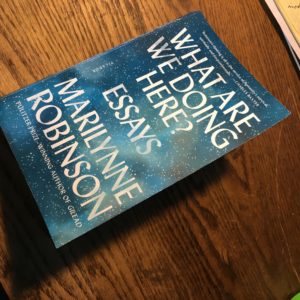What Marilynne Robinson Is Saying to Us
 A couple weeks ago we went to Seattle’s Town Hall to hear Marilynne Robinson read from her most recent collection of essays, What Are We Doing Here?
A couple weeks ago we went to Seattle’s Town Hall to hear Marilynne Robinson read from her most recent collection of essays, What Are We Doing Here?
I may be one of her few readers who came to her through her collections of essays, beginning with The Death of Adam, rather than her novels, most famously the Pulitzer Prize winning Gilead trilogy.
While I treasure Robinson’s fiction, her essays are of particular interest to me because it is here she explores the contribution of religion, in particular Christianity, to western culture. Moreover, she understands that this intellectual/ spiritual inheritance has now been all but lost.
Her essays, mostly given as lectures, are uncompromising in asking us to think and think deeply. She notes that we have largely, “surrendered thought to ideology.” Because she does not do that, her thought is both unique and challenging. She can’t be reduced to one side or another in the culture wars.
For a long time there has been a kind of pseudo-intellectual consensus that western culture has been characterized by “advancing” from the constraints of hobbling religion to the liberations of secularism and science. Robinson doesn’t buy it.
“It is,” she writes, “an abuse of science to assume that the methods and terms of its understanding are ever sufficient or final. The understandings of human nature that have been proposed to us as scientific diminish us, even as science itself is amazed by our complexity, even as science itself is a demonstration of our brilliance.”
If one of her themes is to question the “religion primitive, science advanced” formula, another is that Christianity itself posits a fundamental dignity to the human being, which is today in jeopardy. It is this reverence for human dignity that captures readers in her fiction.
“Her purpose,” writes Dinah Birch in The Guardian, “is to claim the respect for the human, which she sees as the bedrock of Christianity, as a means of countering what she characterizes as ‘thinking that tends to devalue humankind, which is an influential tendency in modern culture.'”
Sacrificing faith and the capaciousness of its world-view has not been a liberation, but a diminishment. And so we find ourselves now in a much reduced world, one shorn of mystery. “From the point of view of objectivity as presently understood, beauty and holiness are excluded terms, and grace is as well. The accepted means of establishing what is real cannot acknowledge them,” writes Robinson in her essay, “Theology for This Moment.”
Our heralded “advance” is, in truth, an impoverishment. Here’s a long quote, but an essential one:
“I offer this very dark view of the world not only in order to pose the inevitable question — What is to be done? — but also to respond to this question in terms that are now more or less precluded by the practical urgency of these problems. The response I propose is that we preserve as we can the heritage we have received and that we enlarge and enrich it for the sake of coming generations. (italics added)
“For a long time I assumed that this was simply a thing civilizations did, a practical definition of the word civilization. Now I see that wealthy countries are stepping away from ancient commitments to humanistic education . . . Humanists are the curators, in their own persons, of art, language, music and thought.
“The argument everywhere now is that the purpose of education should be the training of workers for the future economy. So the variety of learning offered should be curtailed and the richness of any student’s education should be depleted, to produce a globally Benthamite uniformity of aspiration and competence, and a subservience to uses not of his or her choosing. Max Weber’s iron cage is slamming shut.”
I am struck here by her notion that transmitting, as well as enriching a heritage, is what civilizations do. But we in the West are cooperating in our own impoverishment while calling it necessary and efficient progress.
There was an interesting essay, this past weekend in the New York Times, “The Sterile, Efficient Life of the Millennial.” A self-identified millennial lamented the sacrifice of beauty and human interaction to speed, efficiency and multi-tasking. She proposed, as a remedy, “slowing down.” That will appeal to many living harried lives. But it may not be the pace per se that is the problem so much as the loss of height and depth, of a faith-informed wonder and awe for life itself.
The power of Marilynne Robinson’s fiction is to show us a world in which ordinary life is vested with the extraordinary and the holy, and to warn of its jeopardy.
![Anthony B. Robinson [logo]](https://www.anthonybrobinson.com/wp-content/themes/anthonybrobinson/images/logo.png)
![Anthony B. Robinson [logo]](https://www.anthonybrobinson.com/wp-content/themes/anthonybrobinson/images/logo-print.png)